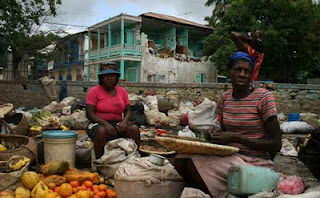link to full statement:
HAITI: AFTER THE CATASTROPHE, WHAT ARE THE PERSPECTIVES ?
Thanks to Greg Chamberlain for for warding this Public Declaration by progressive civil society organizations in Haiti
It represents a strong current of thought among left-leaning Haitians who are both grieving and mobilizing, but are also deeply concerned on a political level, by the widely perceived failure to date of the Preval government to speak out to the Haitian people and the world -- to lead, as they see it; by the US military focus on 'security' vs. food aid in the immediate days after the earthquake -- and the continued US military control of logistics in the humanitarian response; and their concerns about global discussions related to 'rebuilding Haiti' that they feel reflect a neoliberal economic agenda of globalization and not a national agenda developed by Haitiansfor Haitians. - AC
It represents a strong current of thought among left-leaning Haitians who are both grieving and mobilizing, but are also deeply concerned on a political level, by the widely perceived failure to date of the Preval government to speak out to the Haitian people and the world -- to lead, as they see it; by the US military focus on 'security' vs. food aid in the immediate days after the earthquake -- and the continued US military control of logistics in the humanitarian response; and their concerns about global discussions related to 'rebuilding Haiti' that they feel reflect a neoliberal economic agenda of globalization and not a national agenda developed by Haitians
Excerpt:
The emergency aid effor t we are involved in is alternative in character and we expect to advocate a method of work which will denounce the traditional practices in the field of humanitarian aid which do not respect the dignity of the victims and which contribute to the reinfor cement of dependency. We are advocating a humanitarian effor t that is appropriate to our reality, respectful of our culture and our
environment, and which does not undermine thefor ms of economic solidarity that have been put in place over the decades by the grassroots organizations with which we work....
...Massive humanitarian aid is indispensable today, given the scale of the disaster, but it should be deployed in terms of a different vision of the reconstruction process. It should connect with a break from the paradigms that dominate the traditional circuits of international aid. We would hope to see the emergence of international brigades working together with our organizations in the struggle to carry out agrarian refor m and an integrated urban land refor m programme, the struggle against illiteracy and for refor estation, and for the construction of new modern, decentralised and universal systems of education and public health.
We must also declare our anger and indignation at the exploitation of the situation inHaiti to justify a new invasion by 20,000 U.S. U.S. Caribbean Basin
continent against neo-liberal globalization. And it exists also within a framework of pre-emptive warfare designed to confront the eventual social explosion of a people crushed by poverty and facing despair. We condemn the model imposed by theU.S. Venezuela
As leaders of the organizations and platfor m who have set this process in motion, we are writing to share our initial analysis of the situation. We are certain, and you have already shown this to be true, that you will continue to support our work and our struggles in the framework of the construction of an alternative from which our country can rise again from this terrible catastrophe and struggle to break free of the cycle of dependency.
For the Coordinating Committee:
Sony Estéus Director of SAKS
environment, and which does not undermine the
...Massive humanitarian aid is indispensable today, given the scale of the disaster, but it should be deployed in terms of a different vision of the reconstruction process. It should connect with a break from the paradigms that dominate the traditional circuits of international aid. We would hope to see the emergence of international brigades working together with our organizations in the struggle to carry out agrarian re
We must also declare our anger and indignation at the exploitation of the situation in
continent against neo-liberal globalization. And it exists also within a framework of pre-emptive warfare designed to confront the eventual social explosion of a people crushed by poverty and facing despair. We condemn the model imposed by the
As leaders of the organizations and plat
For the Coordinating Committee:
Sony Estéus Director of SAKS



